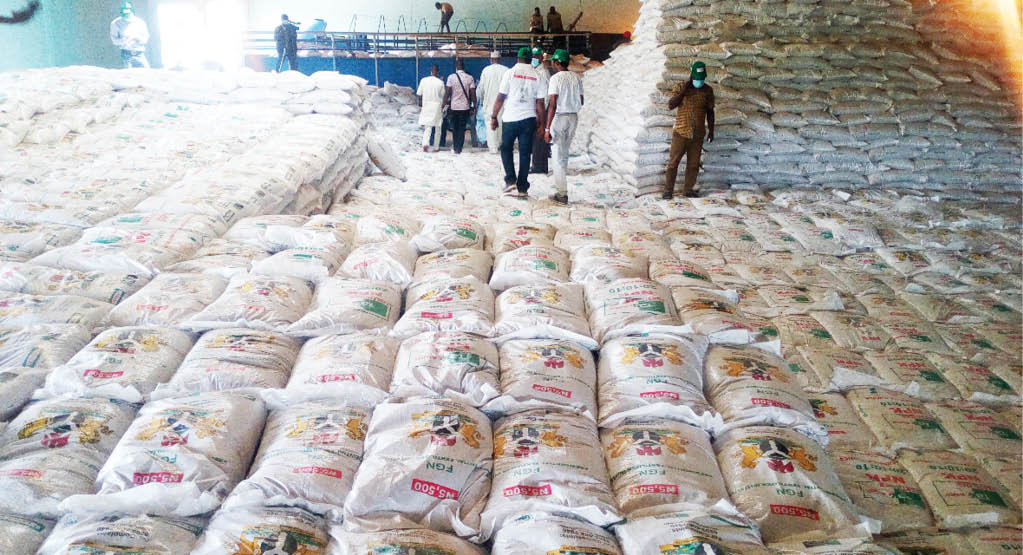How farmers can claim damages with new fertilizer Act
fertiliser manufacturers, suppliers may go to jail The new National Fertilizer Quality Control Act 2019 is a game-changer for the nation’s agricultural sector and a powerful weapon for the farmers. It is a robust legal framework for fertiliser quality control in the country and there is need for proper implementation of the law to […]

File photo of bags of fertiliser
- fertiliser manufacturers, suppliers may go to jail
The new National Fertilizer Quality Control Act 2019 is a game-changer for the nation’s agricultural sector and a powerful weapon for the farmers.
It is a robust legal framework for fertiliser quality control in the country and there is need for proper implementation of the law to bring sanity into the industry marred by all sorts of fraud.
The law empowers the Farm Input Supply Services department of the Federal Ministry Agriculture and Rural Development, to within 30 days, issue license or certificate to qualified applicants, who want to participate in the fertiliser industry. And where such certificates are not to be issued, the reasons must be made clear why such applicants cannot get the certificate.
The minimum content of fertiliser can be found in the first schedule of the Act. Manufacturing, blending, importing or distributing of unbranded or misbranded fertilizer is a serious offense; dealing in adulterated fertilizer, offering for sale fertilizer that is underweight, selling condemned fertilizer or diverting or converting fertilizer, or flaunting a ‘stop-sale’ order. All of these carry a minimum of five years imprisonment without an option of fine.
Use of destructive ingredients or harmful properties in fertilizers, conversion or diversion of fertilizer, sale of unbranded or misbranded fertilizer and obstruction of authorized officers for inspection constitutes a serious violation of the law found in greater detail in part 2 of this Act.
Other major offences
Operating without permit or certificate of registration is a violation of this Act. This offense is created in Section 2 and 8 and punished under Section 20 of the Act, and the punishment is a minimum fine of N5 million, but not exceeding N10 million in the case of a manufacturer, blender or importer. If they are unable to pay the fine, the law will proceed against their assets.
Where a director, employee or agent of such company is found to be liable, they can also be prosecuted under this law.
Also, where a distributor or a corporate person is involved, there is a minimum fine of N500,000 daily as long as the offense persists. There’s also the offense of use of harmful ingredients or conversion or diversion of fertilizer, these offences are created under sections 9 and 10, and the punishment for this offense is at least N1million or a term of imprisonment of at least six months or both.
There’s also the offense of obstructing an authorized officer of the prescribed authority, this offense is created by section 11 of the Act and attracts a punishment of a fine of at least N200,000 or a term of imprisonment of at least six months or both. Where an officer of the federal ministry of agriculture is attempting to visit a factory to do their job, and the owners of the factory obstruct such an officer, those who obstruct the officer will be liable to this offense and they may be punished by the court if they are prosecuted.
Farmers can claim damages in court
This law has widened access to the court, by extending jurisdiction to all high courts, both federal high court, state high court and the rural area where there are no high courts; there are magistrates where these offenses can be prosecuted summarily and action is taken.
Where a farmer suffers losses, he/ she can approach any of the aforementioned courts as the law authorizes the courts to award compensation to protect such farmers who have suffered from the violation of the law.
The loss may include buying adulterated fertilizer that affects his/her produce yields.
Need for more sensitization
The ministry needs a lot of sensitization to draw the attention of the farmers, distributors and manufacturers to the new law. This will enable farmers to take advantage of, and deter perpetrators of fertilizer fraud in the country. There is also a need for the Act, inspection, and analysis manuals to be made available to guide all stakeholders.
